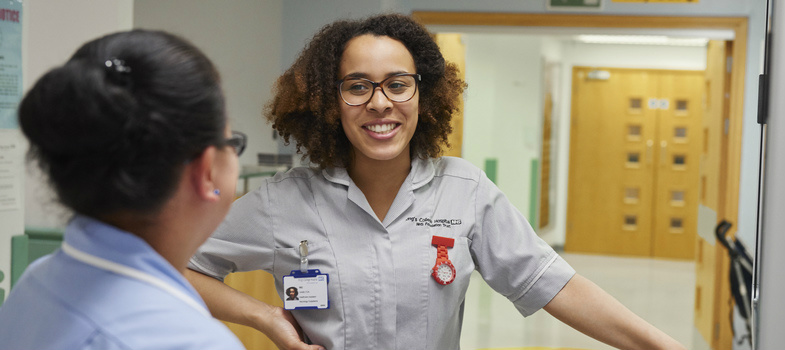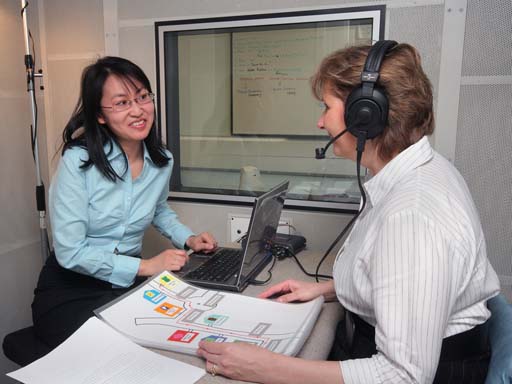4.3 Who is in the multidisciplinary team?
The multidisciplinary team provides expert, professional help to those affected by Parkinson’s. Cooperative health and social care is essential and can make a huge difference to a person’s quality of life. Everyone with Parkinson’s should have access to members of the multidisciplinary team.
The Parkinson’s multidisciplinary team should provide a comprehensive service to patients and their carers from diagnosis to the palliative stage. Clinical guidelines and good practice recommend that referral to a therapist service is considered from the time at which Parkinson’s is first diagnosed and regularly at medical reviews every 6–12 months after that.
The support that people need will vary from person to person, and from time to time. But early intervention from a range of health professionals can help people to maintain their independence for as long as possible.
The following gives a brief overview of the role that different therapists can play in enhancing a person’s quality of life either at home or in residential care. It is important that you know who may be able to support you in caring for a person with Parkinson’s. If you think the needs of someone in your care have changed, you should report this to your manager. They can help you decide who is appropriate to contact. Or you may be one of this team and may need to refer to others.
Occupational therapists
Occupational therapists can help people continue everyday activities when they become difficult to do, so they can stay as independent as possible. People take part in a wide variety of activities and tasks every day. Occupational therapy aims to reduce the impact of health problems on day-to-day life by helping people to remain independent, maintain their interests and adapt to changes in their abilities.
For people with Parkinson’s, even simple tasks and daily activities that they used to do automatically can become slower and more difficult to carry out.
Occupational therapy can help improve people’s ability to continue carrying out tasks such as fastening buttons and dealing with clothing, as well as eating and drinking. The occupational therapist will assess a person’s ability to carry out these activities and suggest ways to make them more manageable.
In addition, occupational therapists can help with motor problems, such as problems with walking. They can also suggest appropriate adaptations, aids or equipment to help people who are having problems getting in and out of bed, moving in bed, using steps and stairs, or maintaining balance.
Physiotherapists
Physiotherapists use physical treatments, including exercise, to help manage any stiffness in joints, and to restore muscle strength and mobility. In the later stages of Parkinson’s, the physiotherapist may focus on walking, posture and balance. They may also start to work with family and carers as part of the treatment process, suggesting ways to prevent falls.
Physiotherapists will assess how Parkinson’s is affecting the person’s movement and function. This can be done whether a person is newly diagnosed, or has lived with the condition for some time. They can then recommend techniques to deal with the problems identified or appropriate exercise programmes to help a person with Parkinson’s improve or maintain fitness. Physiotherapists can also help people with Parkinson’s by providing advice on aids and adaptations.
Clinical guidelines recommend that physiotherapy should be available for everyone with Parkinson’s.
Parkinson’s UK worked with physiotherapists to produce the new Parkinson’s exercise framework [Tip: hold Ctrl and click a link to open it in a new tab. (Hide tip)] . It recommends that exercise can help manage Parkinson’s symptoms. You can download it from the Parkinson’s UK website to help people with Parkinson’s keep moving.
Speech and language therapists
Speech and language therapists are healthcare professionals who specialise in all aspects of communication, from facial expression and body language to speech and communication aids. They can help people with the communications problems discussed in Section 3. Speech and language therapists can be extremely helpful, so we recommend you speak to your manager as soon as possible if the person you care for is experiencing any of these problems.
Speech and language therapists can also give carers and family members strategies and tips to help a person with Parkinson’s to communicate more effectively. These may include simple things such as watching a speaker’s face while they are talking, and limiting background noise, such as sound from a television or radio. Speech and language therapists can also give advice on how to spot the signs that someone may be having problems eating or drinking. Other problems may include producing too much or too little saliva, causing dribbling.
Some speech and language therapists will have taken a special course, called the Lee Silverman Voice Treatment, to help them work with people with Parkinson’s. Many people with Parkinson’s who have taken part in this therapy have found it to be very useful in maintaining their voice control for longer.
Clinical guidelines recommend that speech and language therapy should be available for people with Parkinson’s.
Parkinson’s nurses
Parkinson’s nurses have specialist experience, knowledge and skills in Parkinson’s. They play a vital role in the care of people with Parkinson’s, including offering guidance on managing medication.
They can also offer information and advice to families of people with the condition and other professionals involved in a person’s care. As specialists in the condition, they can advise other health and social care staff, who may not have specific knowledge of Parkinson’s.
Can you find out if there is a Parkinson’s nurse locally? You could try contacting the Parkinson’s UK local adviser, who will know whether there is a Parkinson’s nurse in your area.
Dietitians
Dietitians can help if the person you care for has problems with their diet, for example if they are under or overweight, or have digestive problems, such as constipation.
Who else is in the multidisciplinary team?
- General practitioners (GPs)
- Parkinson’s specialists
- Pharmacists
- Practice nurses
- Psychologists and counsellors
- Social workers
- Healthcare assistants/nursing support workers
4.2 What are the three main ways to manage Parkinson’s?

